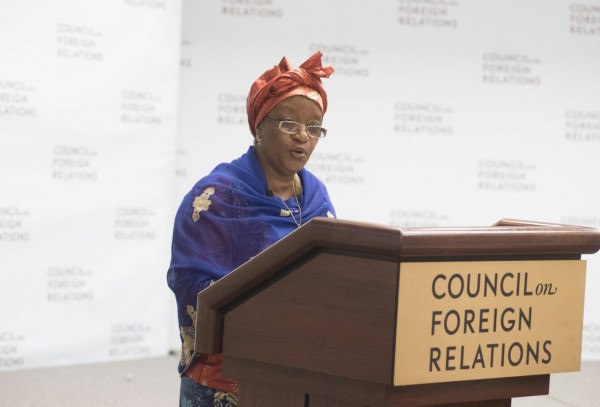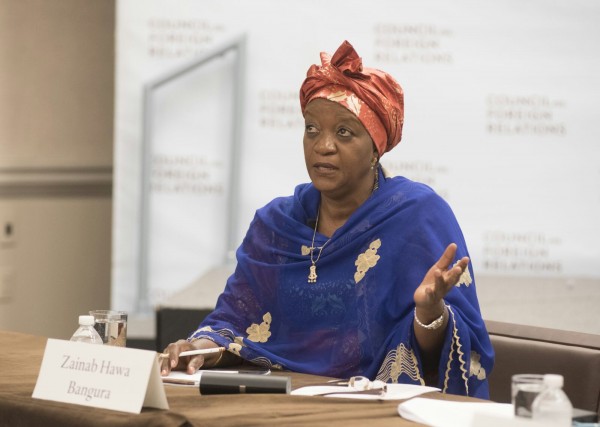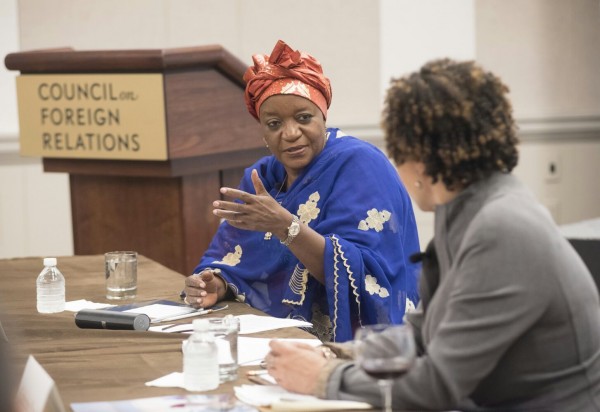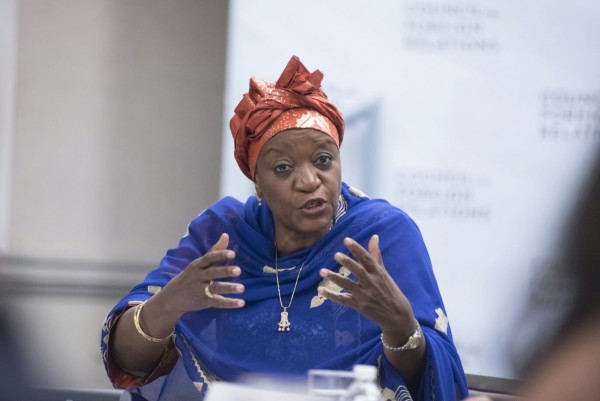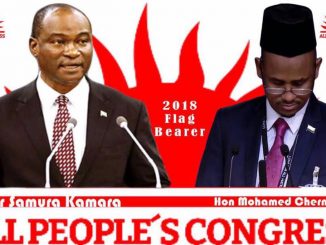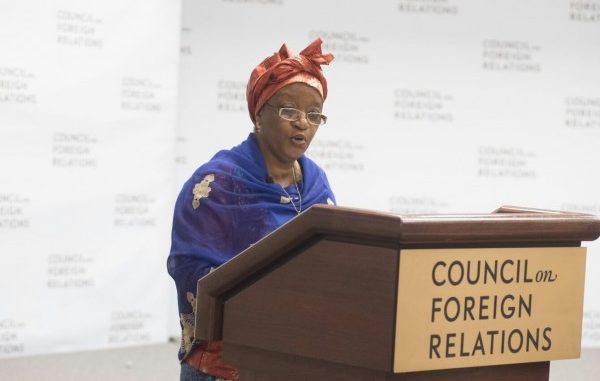
The Special Representative of the UN Secretary General on Sexual Violence in Conflict was invited by the Council For Foreign Relations which is one of the big and influential Think Tank institutions in the US. She was asked to give this talk and engage in a Question and answer session with some of its members in line with the huge advances been made on this issue within the last few years both at the UN Security Council and the UN General Assembly.
It must be noted that UN Security Council Resolution 1820(2008), acknowledge that sexual
violence employed as a tactic of war can be a threat to the maintenance of
International peace and security.
Secondly, UN Security Council Resolution 2242(2015) notes that sexual violence
is used not as a tactic of war, but also as a tactic of terror by certain
extremist groups, as a means to advance their key strategic objectives.
Thirdly, The Secretary General’s Plan of Action to Prevent Violent Extremism,
adopted by General Assembly Resolution on the 12th February, 2016, notes
that we must ensure that the protection and empowerment of women is a
central consideration of the strategies devised to counter terrorism and
violent extremism.
Finally, General Assembly through Resolution A/RES/69/293 adopted on 13th
July 2015 designated 19 June International Day for the Elimination of
sexual violence in conflict, to focus attention on the crime and honor the
survivors.
——————————————-
Remarks of SRSG Zainab Hawa Bangura during the Roundtable discussion on
“Violent Extremism & Sexual Violence as a Weapon of War”
Tuesday, 28 June 2016, 17:30 – 19:00
Council on Foreign Relations, 58 E. 68th St
***
Professor Catherine Powell, Fellow for Women and Foreign Policy at the Council on Foreign Relations,
Distinguished participants, ladies and gentlemen, good evening.
***
I would like to thank the Council on Foreign Relations for hosting this roundtable discussion, and for supporting efforts to advance the Women, Peace and Security agenda, both nationally and internationally.
This meeting is particularly timely, as just last week we observed the first International Day for the Elimination of Sexual Violence in Conflict. This date – the 19th of June – was designated by the UN General Assembly as a moment to stand in solidarity with the survivors, and with those working on the frontlines to support them, often at great personal risk.
To mark the occasion, my Office has displayed a series of photographs in the United Nations lobby. The aim of this exhibit is to put names and faces to crimes that have long been obscured by the so-called “fog of war”.
One image is that of a survivor named Nasima, who endured sexual enslavement in ISIL captivity. She says: “When ISIL heard an airplane overhead, they would send me out; they thought that if the pilots saw me, they would not bomb them. But I hoped they would”. For Nasima, bombs were preferable to repeated and relentless rape.
Another survivor featured in the exhibit is Sadiya. She was kidnapped by Boko Haram and fell pregnant as a result of rape. When she was eventually released, the local militias that were fighting Boko Haram threatened her, saying that they would return to kill her baby as soon as it was born. Sadiya’s story shows how women can be victims of both terrorism, and the counter-terrorism response. Women, who had no voice or choice in the waging of war, can find themselves targeted by men with guns on either side.
***
The International Day was also an occasion for taking stock of achievements and challenges.
Indeed, recent years have given us great cause for celebration, but also grave cause for concern.
It was on the 19th of June 2008, that the Security Council elevated the issue of sexual violence as a tactic of war onto its agenda. That meant re-thinking and re-framing it as a peace, security and Rule of Law imperative. This new paradigm has shifted the way that sexual violence is perceived: it can no longer be dismissed as an “inevitable byproduct of war”, mere “collateral damage”, or the “random acts of a few renegades”.
Through a series of successive resolutions, the Council established a new international architecture for combating sexual violence during and in the wake of war. This included the creation of my mandate in 2009, as well as a Team of Experts on the Rule of Law, working out of my Office, to support governments to strengthen institutional safeguards against impunity. It also called for the deployment of dedicated Women’s Protection Advisers in the field to improve monitoring and reporting as an evidence-base for action.
The United States played a leadership role in framing these breakthrough resolutions, affirming that “the challenge of sexual violence in conflict cannot and should not be separated from the broader security issues confronting the Council”. This cast a political spotlight on a scourge that had been called “history’s greatest silence”, and the “world’s least-condemned crime of war”. It clarified – once and for all – that sexual violence is not cultural, but criminal.
***
The task conferred upon me, is to translate groundbreaking resolutions, into solutions on the ground.
To this end, I have agreed Joint Communiqués to combat sexual violence with the authorities of the DRC, the Central African Republic, Guinea, Somalia, and South Sudan, as well as frameworks of cooperation with regional bodies like the African Union and the League of Arab States.
Further to these agreements, the President of the DRC has appointed a Special Representative to fight sexual violence; the President of Somalia has committed to establishing a specialized crimes unit in the police; and the Central African authorities have passed legislation to establish a special criminal court, and a joint rapid response unit on sexual violence in the gendarmerie.
My Office also compiles the annual Report of the Secretary-General on Conflict-Related Sexual Violence, which spans 19 countries. We have brought copies of the most recent report for distribution today. As you will see, it includes a list that “names and shames” credibly suspected perpetrators of sexual violence. Listed parties are required to take immediate action to investigate and prosecute these crimes. The report is a critical accountability tool, as being listed can lead to sanctions and other political, diplomatic and legal consequences.
While accountability is critical, my Office does not just “name and shame”; we also take every opportunity to “raise and praise” good practice and progress made by Member States.
For instance, I recently visited Côte d’Ivoire where 47 commanders have signed a commitment to take action against sexual violence within their units, and the military high command has adopted a Code of Conduct on sexual violence prevention for all Ivorian soldiers. This sets a precedent that can inspire others, and be replicated elsewhere.
***
The past year has also seen major milestones in the quest for justice.
Last July, 16 high-ranking officials – including former President Moussa Dadis Camara – were indicted for the politically-motivated massacre and mass rape that took place in Guinea in 2009. My Team of Experts on the Rule of Law provided technical assistance to bring hundreds of cases to court.
In March of this year, the International Criminal Court delivered its first conviction – at the level of command responsibility – for sexual violence crimes. This trial, of former Congolese Vice-President, Jean-Pierre Bemba, may have concerned just one perpetrator, but it gave voice to thousands of victims and witnesses from across the Central African Republic, where he waged war.
In May, the Extraordinary African Chambers in Senegal convicted the former President of Chad, Hissène Habré, of war crimes and crimes against humanity, including rape and sexual slavery. Once again, this process amplified the stories of survivors, and exemplified the determination of human rights defenders.
These convictions send a powerful signal that no military or political leader is above the law, and no civilian is beneath its protection.
***
I firmly believe that prosecution is also a form of prevention. It can restrain the behavior of belligerents, deter future crimes, and break the vicious cycle of violence, impunity and revenge.
But to turn that vicious cycle into a virtuous cycle of rights, dignity and respect, we must deliver justice – not just law.
Justice is not something that can be confined to a courtroom. It entails validation, reparations, and service-delivery. The Colombian peace process sets a path-breaking precedent in terms of reparative justice for wartime rape. Hundreds of rape survivors have received compensation, land restitution, employment opportunities, and credit, as part of this process.
Overall, it is my view that the past decade has seen greater progress to fight sexual violence as a tactic of war, than the rest of human history combined.
***
Yet, just as we take stock of this evolution, we also confront stark new realities. This includes previously unforeseen – almost unimaginable – threats, such as the systematic use of sexual violence as a tactic of terrorism.
Terrorist and violent extremist groups are using sexual violence to advance their military, political, economic – and even ideological – aims. Without exception, the rise of violent extremism has been accompanied by crackdowns on women’s rights and freedoms. Extremists know that to populate a territory, and control a population, you must first control the bodies of women.
Despite this, when we think of terrorism, we tend to think of hijacking, hostage-taking, explosions, and property destruction. But we cannot deplore the public face of terrorism, while ignoring the violence that terrorists inflict on women and girls in private, behind closed doors.
Even as we speak, over 3,000 women and children remain in ISIL captivity. They continue to be traded, trafficked, auctioned and ransomed, as part of the political economy of war and terror. ISIL treats them as a kind of currency: to compensate its fighters, attract new recruits, and consolidate its power.
When I visited the Middle East last year, I met girls who had been traded up to eight times during their two years in captivity. Each transaction turned a profit for their captors. Forced marriage and sexual slavery is not incidental, but integral, to ISIL’s campaign of conquest and genocide, particularly against the Yazidi minority.
Right now, hundreds of Nigerian women and girls remain in the hands of Boko Haram, including over 200 of the 276 abducted “Chibok girls”.
For these women and girls, justice delayed is more than justice denied: it is terror and trauma continued.
***
Trauma also lives on in the plight of children born of wartime rape, who remain in the shadows: marginalized, undocumented, and often stateless. Up to 8,000 children are estimated to have been born as a result of rape in Northern Uganda alone. Hundreds live in Bosnia, Rwanda, Kenya, Nigeria, my own country Sierra Leone, and elsewhere. This is both a human rights and a security issue: with scant education, skills or social ties, such children may have no other opportunities than those presented by the armed and extremist groups themselves.
The weapon of rape is consciously used to shred the social fabric, as the shame can turn victims into outcasts. After all they have endured, many abducted women, especially those who return home pregnant or with children, face the additional heartbreak of being shunned by their own family and community. As we strive to “bring back our girls”, we must also find ways to bring them back to an environment of support and opportunity. It is critical to bring them back, not hold them back.
***
Rape, and the threat of rape, can create a climate of fear, which drives displacement, and further erodes community cohesion. The use of sexual violence as a “push factor” to displace persecuted minorities in and around Syria has been linked with the current mass migration crisis. Sexual violence remains a security risk in camps, informal settlements, and other places of supposed refuge.
Men and boys are also victims of sexual violence, including as a form of torture in contexts of detention and interrogation.
In addition, the targeting of individuals on the basis of their actual or perceived sexual orientation is of increasing concern, and has been a “blind-spot” in the Protection of Civilians response to date.
***
Ultimately, justice may be elusive for the thousands of civilians who have been abused by ISIL, Boko Haram, Al-Shabaab, Ansar Eddine, and other extremist groups that have no regard for international law or international legitimacy. But even if these groups are beyond the reach of judicial deterrence, we can and must mobilize the moral authority of progressive religious and traditional leaders. They have the power to help shift the shame of rape from the victims to the perpetrators, and support the social reintegration of survivors.
My Office is working with Al-Azhar University in Cairo to develop an Islamic counter-narrative to ISIL, and to negate their attempts to legitimize rape on religious terms. After all, no UN workshop on human rights will ever be as well-attended as Friday prayers or Sunday sermons!
ISIL and its affiliates are sophisticated in their marketing of savagery. Information is their oxygen, and we must find ways to suffocate them! This will require a communications counter-offensive. It will involve greater investment in the capacity of women’s groups to lead grassroots efforts to curb extremism and youth radicalization. And it will compel us to keep the searchlight of international scrutiny on these historically-silenced crimes.
For me, everyday – not only the 19th of June – is a day to work towards the elimination of rape in war. It is a day to give hope to those who have survived, and to remember those who have fallen victim. These women and girls are not abstract statistics. They are mothers, daughters and sisters like Nasima of Iraq, Sadiya of Nigeria, and the countless others like them, across the long sweep of history, in nations torn by war.
Thank you, and I look forward to our discussion.
***

